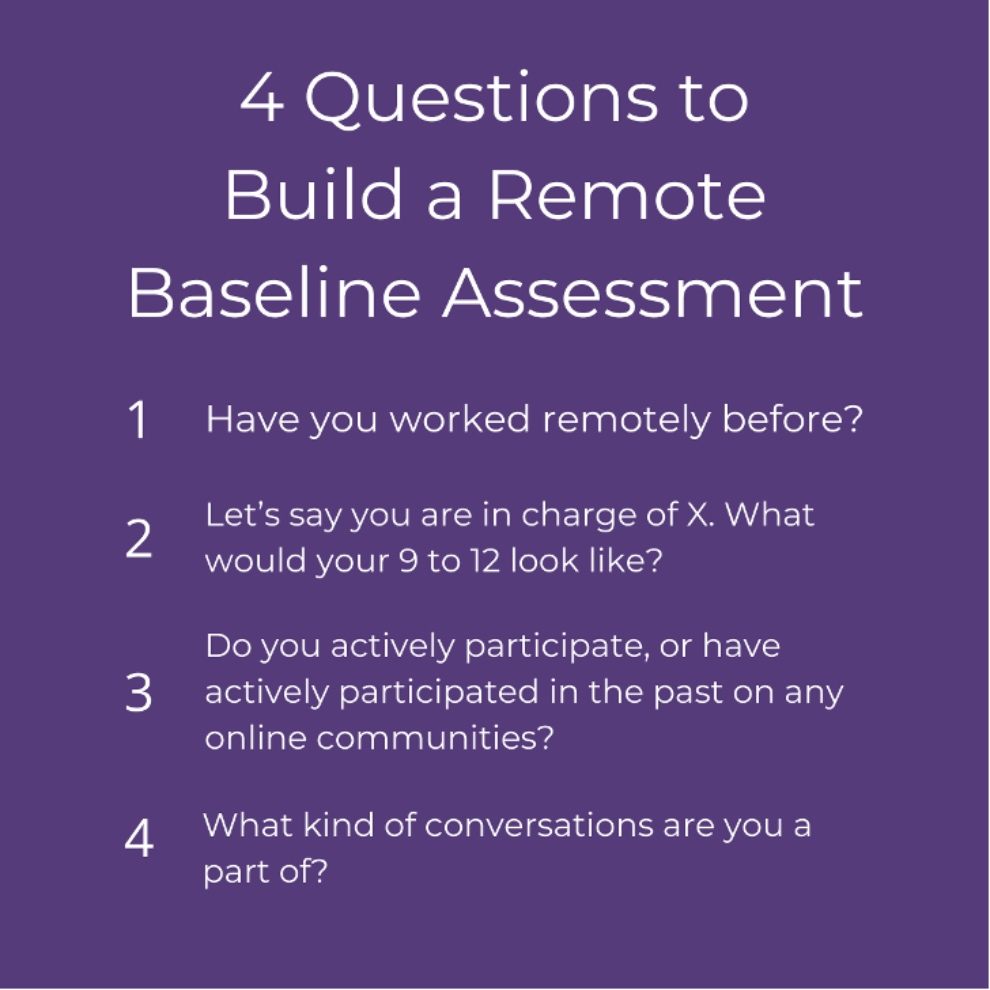
Evaluating remote candidates: Dos and don’ts
2020 arrived and just like that, remote work went from “nice to have” to “the way we work.” HR, in particular, was turned on its head. Things like upholding cultural standards, watching out for burnout, sourcing for recruits, candidate evaluation — all are complicated by the lack of physical presence. Fully remote companies like DistantJob found themselves in the position to offer mentorship and advice to many businesses trying to cope with the new reality of finding and assessing remote candidates in a post-COVID world.
Part of the challenge is that it just isn’t good enough to find someone proficient at the technical aspects of their job. Let’s say that you want to evaluate IT candidates remotely — I’m using that example because that’s DistantJob’s specialty and raison d’être — you would ordinarily hand them over a test that would measure their proficiency with their chosen programming languages, and have some calls to access their cultural fit and soft skills.
But now, you know that if you hire them, they won’t be working in the same building as the rest of your team, and that complicates things. In a remote situation, communication bandwidth is massively reduced, so the existing communication must be more frequent and of higher quality. So, you want to conduct a remote evaluation that assesses a candidate’s overall communication skills, with special focus on the written word because that still accounts for the vast majority of online interaction.
You also want to make sure they have the ability (and remote work setup!) to be focused for long periods of time; to be able to hold themselves accountable to project deadlines; and to be intrinsically motivated. These last two parameters are tied to culture, so let’s start by talking about culture for a bit.
Is culture fit important?
Think of your company culture like one of those concentrate-based juices. It’s supposed to be diluted with water, and if you drink it directly from the bottle, you are going to have a bad time. That’s what happens in offices where a culture code is very strictly enforced. They tend to devolve into something that looks less like a healthy team and more like a college fraternity.
When people are packed together in a physical location, the cultural concentrate naturally does its job and all you, as a leader, need to do is to steer its growth gently like one of those grandfatherly kung-fu masters used to trim their bonsai trees in old movies.
Now picture remote work, and it’s like adding a bucket of water to the concentrate. Suddenly, the juice doesn’t taste like anything. You need to double down on the concentrate. Remote work makes many aspects of running a business better and more healthy, but culture? Culture needs work.
And why bother making it work? It turns out that culture is more needed in a remote setting. When we see our colleagues and peers working hard, we, for whatever reason—call it shame, competitiveness or inspiration, it doesn’t really matter—are more likely to up our game. This really struck me in my youth, during my World of Warcraft years.
Make Work, not Warcraft

In that video game, people banded into raiding guilds to take on the game’s greatest challenges. Those challenges — called raids — required teams of up to 40 people to prepare and coordinate together for 8 to 20 hours a week, in blocks of 4+ hours. It was incredibly taxing for what was supposed to be a leisurely activity, and what’s more, it required players to commit extra time outside those activities to prepare — crafting their equipment, brewing their potions, etc.
What I’ve found out was that the most successful guilds had a heavy social component, and interviewed mercilessly for culture. And I do mean mercilessly — I never failed a job interview in my life, but I was rejected by several raiding guilds!
The guilds that only scheduled to meet at the times appointed for raiding would always have a big percentage of players who showed up under-geared and unprepared, with a “happy-go-lucky” attitude and expecting to be pulled up by the more experienced players. It was only a game, after all.
But the other guilds, the ones where the players stuck together for all other game activities, the ones where they were constantly chatting about their personal lives, dreams and goals, the ones who kept open voice servers going on 24/7 so there would always be a virtual “guild hall” where you could hang out… None of these players would be caught dead without all their potions and gear in order. They would melt in shame if it was raiding time, and they were not there ready and on time.
In the online world, culture is everything.
And remote work is online work.
Dos and don’ts for assessing remote candidates

Do make video the primary means of interacting and evaluating
If you want to have a chance to bond with the person you’re hiring, and learn what they are all about, body language is indispensable. Clichéd as it might sound, you want to see the excitement in their faces, or the nervousness, or something that tells you they actually care about the job they are applying to. Bonus points: you get to see if they can focus, or if their eyes are all over the place (probably checking Facebook or shopping on Amazon during the job interview).
Don’t decide without extensive written communication
You aren’t going to have your new employee spending all the time on video. At DistantJob, when we want to evaluate IT candidates remotely, we pay a lot of attention to the written word because all project management systems, and most of online communication, is text-driven. So, it doesn’t matter if a person is excellent at face-to-face communication, if they write in an unclear manner. Look for people who aren’t lazy about writing, and who do so in as clear and unambiguous a manner as possible.
Do judge them for their connection and audio/video quality
Back in 2001, I was coordinating online in a 3D game with 39 other people, while chatting on VoIP software that’s probably older than some people reading this. If I could do this for a leisure activity 19 years ago, then in 2020, your candidates can have a consistent audio and video feed and a decent webcam that doesn’t make them sound and look like they are part of a witness protection program. If they don’t, then they don’t care. Do you want to hire people who don’t care?
Don’t expect them to make eye contact
The art of video conference eye contact is a hard one to master. It basically entails you looking at your webcam instead of the screen. Personally, I like when other people do it for me, but when I am doing it, it weirds me out. It feels much more natural to me to look at people’s faces on the screen — and of course, from their perspective, I’m not looking at them. Technology still needs to improve here, so give people a break and don’t assume they aren’t paying attention to you.
Do ask them what they do for fun
The reason why hobbies are important when assessing remote candidates comes back to cultural fit. Your team doesn’t (and shouldn’t) have to become your new employee’s second family, but if they are, let’s say, a very sporty and outdoorsy person, and the rest of your team is all book clubs and online games, there’s not going to be a lot for them to bond over apart from work — and work is usually not enough.
Don’t try to look for your new BFF
Going too far with the previous point is unproductive. You’re doing a remote evaluation for a job, you don’t need the person you pick to know the quotes from your favorite movie, or to be into the same sports and teams that you are into. I mean, that would be nice, and if someone comes around that feels like a soul mate, consider that in their favor, but that shouldn’t be a requirement!
Do ask them to describe their workday
Many people are jumping on the remote work train without having any practice or even basic training on what working from home is like. The result: a disorganised schedule where everything from the kitchen sink to petting the cat takes a bit off their focus and prevents them from working in focused blocks of time. When conducting a candidate evaluation, one of the most powerful questions you can ask is for them to describe how they will perform their function as a daily routine. It will be abundantly clear whether they have figured it out.
Don’t expect it to be the same as yours
We’re all still figuring it out how this works, and one of the benefits of working from home is that people can tap into their natural and personal rhythm better, to be more productive and healthier. The key thing is not that they work exactly as you do, but that they communicate their work clearly and frequently.
Do keep your normal expectations
Remote work is work. Your expectations when assessing a remote candidate should be the same as when assessing any other candidate. Don’t cut them any slack because they are remote; professionals are professionals, and you are entitled to expect them to act as such. Of course, do consider that 2020 is a year of adaptation for everyone, and even the experienced remote workers aren’t completely unaffected by all the outside pressure and stresses.
Don’t think all remote workers are made equal
There is a clear distinction between full-time remote workers (let’s say, a single mother who has a home office setup, so she can develop her career while she has more quality time with their kid) and digital nomads (picture the stock-photo millennial sipping a pinã colada at the beach with their laptop semi-open in their lap. More information on how to become a digital nomads and what defines nomads you can find on http://thinkremote.com/).
For sure there are plenty of pinã colada-sipping geniuses out there who are super productive and do the work for ten men during a sunny afternoon. But we haven’t met any.
When conducting a remote evaluation, always ask people why they want to work remotely. Because some reasons are better than others, and you want someone who wants a job where they can grow, not only a paycheck to support their lifestyle.
Final tips to successfully hiring talented remote employees
There are some simple questions that you can use to build a remote baseline assessment. This won’t give you the full low-down on your remote candidate, but it can help you filter out many incoming candidates and bubble the best ones to the top of your résumé pile!

These questions might feel very surface-level, but when assessing remote candidates, they’ll help you build a preliminary picture of their online persona, remote work experience level, and ability to communicate online.
Now if only there was a way to easily build and distribute such an assessment!
Author’s bio: Luis Magalhães is founder and editor-in-chief at Think Remote. He writes about how to build and manage remote teams, and the benefits of hiring remote workers. He is also the host of the DistantJob Podcast, where he talks to world-class remote leaders, learning their strategies and tactics. He‘s been managing editorial teams remotely for the past 15 years, and training teammates to do so for nearly as long.














